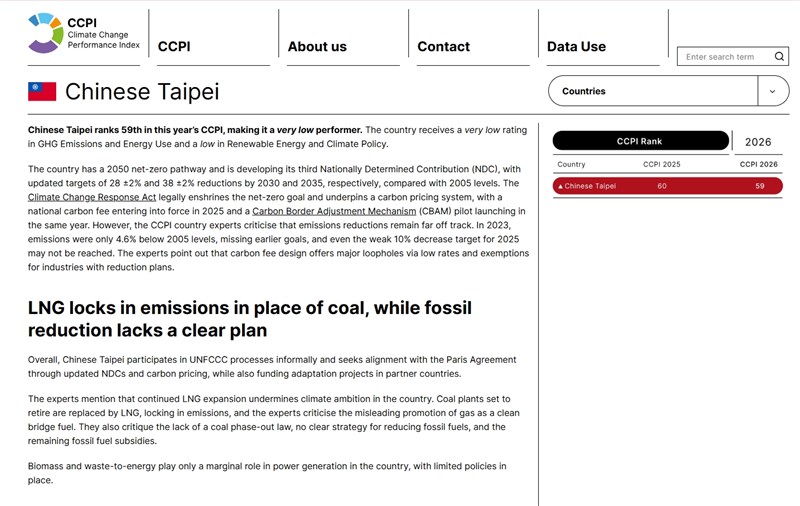
Taipei, Nov. 19 (CNA) Taiwan is again pushing back against an international climate ranking that rated Taiwan as a "very low" performer on climate change, arguing that a decline in carbon emissions for a third straight year shows its policies are working.
In the Climate Change Performance Index (CCPI) released Tuesday, Taiwan ranked 59th out of 67 positions, up from 60th last year and 61st two years ago.

For the four main categories considered in each economy's final score, Taiwan received a "very low" rating for greenhouse gas (GHG) emissions and energy use and a "low" rating for renewable energy and climate policy.
Each category considers indicators that highlight both existing conditions and trends, and Taiwan generally did better in the "trend" indicators than those describing the current situation.
In response to the index's results, the Climate Change Administration of Taiwan's Ministry of Environment (MOENV) disputed the report's findings on the same grounds it has stated in recent years, arguing that the methodology is "controversial."
It said Japan (ranked 57th) and Canada (ranked 61st) had also questioned the rankings at the CCPI press event this year.
The ministry said the CCPI relies on per-capita emissions in its rankings, which it argued is unreasonable, noting that the United Nations' Emissions Gap Report 2025 stated that climate effort evaluations should also take into account total emissions and overall trends, not per-capita data alone.
The report showed Taiwan's per-capita emissions as 10.92 tons of carbon equivalent per person, lower than 12.85 tCO2e for South Korea, 16.69 tCO2e for Canada, and 15.23 tCO2e for the U.S., but higher than the 3.84 tCO2e for Thailand and 4.07 tCO2e for Malaysia.
The ministry said Taiwan was actually lowering carbon emissions, citing the 2025 Global Carbon Budget, released earlier this month, which estimated that Taiwan's carbon emissions fell 2.1 percent in 2025 from 2024.
That placed it among one of 35 countries "reducing emissions while growing their economies."
Moreover, the Emissions Database for Global Atmospheric Research, run by the European Commission's Joint Research Centre, found that Taiwan's emissions were down 9.6 percent in 2024 compared to 2005, while global emissions increased by about 30 percent, the ministry said.
According to that study, Taiwan and Japan, whose emissions decreased by 23.5 percent, were the only two major Asian countries with decreasing trends in carbon emissions, the ministry said.
The CCPI report
Germanwatch, one of the publishers of the index, previously told CNA that it preferred the per capita emissions metric because it better reflects the need for a quick reduction of total global emissions to limit the increase in global temperatures to 1.5 degrees Celsius above pre-industrial levels, as agreed in Paris in 2015.
In the report detailing the CCPI index, the experts covering Taiwan criticized its continued expansion of liquefied natural gas (LNG) in place of coal, which locks in emissions.
At the same time, they said, there is a lack of laws and clear strategy for phasing out coal and reducing fossil fuels, and while there is a range of renewable plans, implementation has been slow and inconsistent.
The numbers bear the experts out. Having phased out the last nuclear power reactor in Taiwan in mid-2025, Taiwan derived 85.5 percent of its electricity from fossil fuels in the first nine months of 2025, up from 83 percent during the same period of 2024.
Within the fossil fuel category, 47.1 percent of all power generated was from LNG, up from 41.5 percent a year earlier, while 36.8 percent was from coal, down from 40.1 percent year-over-year.
Renewable energy, consisting of hydro, geothermal, solar, wind, biomass, and waste, provided 12 percent of Taiwan's power needs in the first nine months, up from 10.8 percent a year earlier, according to Energy Administration statistics.
The government had projected in 2016 when it introduced its plan to phase out nuclear power, and the 12 percent to 14 percent of Taiwan's power mix it provided, that 20 percent of Taiwan's electricity would come from renewables by 2025.
East Asian economies generally fared poorly in the index, with China ranked 54th, Japan 57th, and South Korea 63rd.
The United States finished 65th, down eight spots from a year earlier, and major oil producers UAE, Russia, Iran, and Saudi Arabia all ranked in the bottom six places.
The index is based on four categories: GHG emissions (accounting for 40 percent of the overall score), renewable energy (20 percent), energy use (20%) and climate policy (20%).
The CCPI monitors countries' climate mitigation performances with the aid of 450 national experts evaluating countries' most recent national and international climate policies, according to its official website.
-
Politics
Two Taiwanese stranded in Israel amid conflict reach Jordan
03/02/2026 09:02 PM -
Business
124,000 Taiwanese have at least NT$100 million in assets: Report
03/02/2026 08:53 PM -
Society
Rain, cooler weather expected across Taiwan on Lantern Festival
03/02/2026 08:13 PM -
Society
Iran conflict to 'severely' delay Taiwan mail to 17 countries
03/02/2026 06:32 PM -
Cross-Strait
Iran could cloud Trump-Xi talks but unlikely to spark Taiwan war: Scholars
03/02/2026 06:13 PM